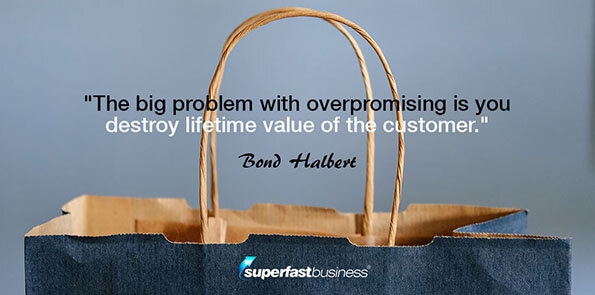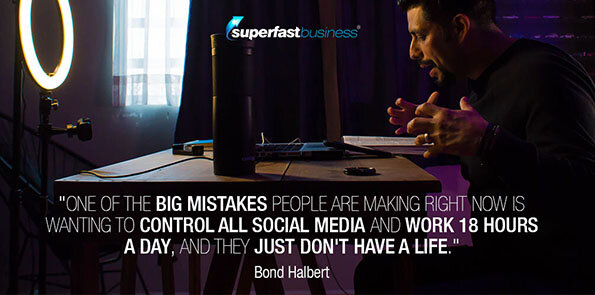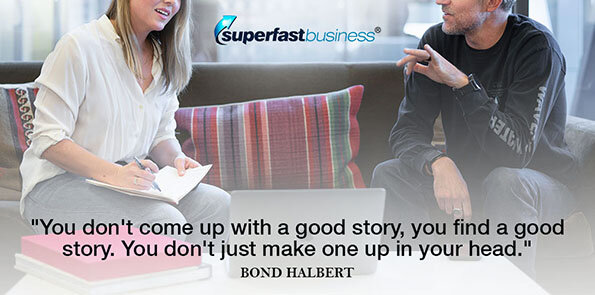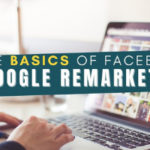Many copywriters overlook how right research and careful copyediting can empower a message. Bond Halbert teaches both and has written a whole book on editing.
Listen in as Bond shares why thorough research is the essential first step in ad writing. You'll also take away sharp tips on story, editing, market-level awareness, and more.
Podcast: Download (Duration: 45:19 — 42.0MB)
Get Notified Of Future Episodes Apple Podcasts | Spotify | Amazon Music | Android | Blubrry | Gaana | TuneIn | Deezer | Anghami | RSS | More
Episode highlights:
Deliver the right marketing message with help from James
Today’s is a special episode, because it reunites James with a good friend – ad writing/copywriting legend, Bond Halbert, son of Gary Halbert. Besides catching up, they’ll be discussing why research is paramount for good ads, a valuable framework for right messaging, and how to choose the people you follow.
This is Bond’s third appearance on SuperFastBusiness. His first dates back to 2010, when James got a video with him at John Carlton‘s Action Seminar, where they first met. His last guesting was in 2016, where he spoke on his then new book about copyediting, The Halbert Copywriting Method Part III.
If you don’t already know Bond Halbert
For listeners not familiar with Bond Halbert, he opens with a bit about his roots.
Gary Halbert, his dad, was arguably one of the best copywriters in history. He wrote more winners in more niches, selling to more different types of prospects – a tough thing to accomplish these days, with all the specialists out there. He influenced a lot of copywriting careers, and Bond was one of his first proteges.
After Gary’s passing, Bond and his brother Kevin carried on the torch. They applied the foundations in new ways, adapting to new technologies and discovering new techniques.
Bond’s real passion is teaching copywriting. He comes up with ways to write better ads, create better marketing, and to do it faster. He then teaches it to people in ways that shorten the learning curve. His son and daughter are getting an early education in copywriting as well.
What Bond focuses on, he says, is the messaging, matching the offer with the market, coming up with unique solutions. He likes to categorize people in the industry as follows:
1. Tinkers – They’ll play around with something, a fad for instance, just to mess with it (Bond puts himself in this group).
2. Early adopters – These will put the work ethic into a thing that tinkers may not.
3. Master marketers – They take the message and do something with it.
4. Master managers – They’ll take stuff that’s worked for years, and make the most comprehensive guidebook, program, software, covers, everything.
Each to their own area of expertise
Bond is quite happy where he is in the spectrum. As he read in the book, Rocket Fuel, the creative brain doesn’t live in the same skull as the number-cruncher.
“There’s a lot of things you could be an expert at, but some of them aren’t that important. “
For most people, says James. He considers himself part visionary, part integrator, rather than leaning strongly towards either. There’s a lot of things you could be an expert at, he says, but some of them aren’t that important. And it’s good to know yourself, whether via Kolbe or something similar.
It may be okay to dip lightly into things rather than go deeper. A Kolbe score might reveal you’re more the type of person who easily catches on to things, and less the type who likes to follow them through. There’s different roles one can play, and Bond seems to have found his.
The people you really want to follow
Would Bond agree that some of the best practitioners in a field are not the most famous?
Absolutely, says Bond. The famous people are usually the master managers. They rarely invent anything, but they make a lot of money. And he says that without any kind of judgment. People just find where they’re comfortable in their space.
 He was just telling his son that some of the most famous marketers are not the people that you really want to follow. You want to follow somebody who’s a little ahead of that position where you see yourself at that moment. And he doesn’t mean follow as in do everything they do. He means, pay attention to what they’re doing to what’s coming, what’s new.
He was just telling his son that some of the most famous marketers are not the people that you really want to follow. You want to follow somebody who’s a little ahead of that position where you see yourself at that moment. And he doesn’t mean follow as in do everything they do. He means, pay attention to what they’re doing to what’s coming, what’s new.
“A wise person can learn from a fool, but a fool learns from nobody.”
It’s a big mistake in any industry, he says, to follow people by the level of fame that they have. His mom would remind him, A wise person can learn from a fool, but a fool learns from nobody. And his dad taught him, you can learn from anybody.
It doesn’t make a difference, he says, whether you’re famous or not. The idea on its own should say, This stands out, that makes a lot of sense, that’s what I should be doing. So he pays attention to people with that effect, who make light bulbs go off in other people’s heads.
“Just because someone has a lot of followers doesn’t mean what they’re saying or doing is the right thing for you.”
James agrees. Just because someone is good at getting attention and has a lot of followers, doesn’t mean that what they’re saying or doing is exactly the right thing for you.
It’s not hard to do your due diligence, but it’s essential
One of the things Bond teaches copywriters is research. A lot of people will present a 10-minute talk on the topic. Bond walks people through the process.
Research is something you should put serious time into, he says. The best copywriters are willing to get on the phone with actual customers and talk to them. They’re willing to go out and spend time with them.
They’re willing to go through the process of buying whatever it is you’re selling, and find all the ins and outs and figure out ways to make the light bulbs go off, give people aha moments, educate them, show them things that nobody else is telling them. That kind of due diligence makes the difference between the A-lister and everybody else.
The example he always gives is the Domino’s Pizza campaign. In an industry where recipes and ingredients were hotly competing, they went to the customer. The customer was tired of not knowing when the pizza would arrive. And when they solved that problem, they were able to dominate in it.
One of the biggest mistakes in copywriting is that people don’t put enough work into the research.
“The people who are good at research, and the people who are good at editing will have the advantage.”
Mistakes you’ll want to avoid
Some of the other mistakes that will get you in copywriting, says Bond, are:
-Paying attention only to part of the campaign – just the bullets, the offer, or the headlines. What about things like closing arguments?
– Speaking to people at different market level awareness all at the same time, and not educating them. For people who don’t know, groups of market level awareness are:
1. People who don’t know they have a problem
2. People who know they have a problem, but don’t know what the solutions are.
3. People who know what the solutions are, but which one’s not right for them.
4. People who know the advantages and disadvantages of solutions.
5. People who are brand loyal.
Your company can go after all of the above. But your marketing needs to take those market-level awarenesses one at a time and educate them so that they’re the next market-level awareness.
One of the keys to effective storytelling
Bond has been asked, how do you come up with a good story? His answer is, You don’t come up with a good story, you find a good story. You don’t just make one up in your head. You can create a typical scenario out of three or four people’s average experience, but you can’t pull something out of nothing.
If you ask the right questions, people will practically write the story for you. Bond took a bell-curve story arc and created questions for its different parts, some of which were: an inciting moment, frustration, the great ending. These questions you can take to a group of prospects and ask out of order. For a group of copywriters, for instance:
– Tell me about your struggles and frustrations in getting your first clients.
– What were you doing before you became a copywriter?
– What was it like when you first had your aha moment, and you had your first winning copy?
– What’s life now that you don’t have to work a second job, and you made this your main profession?
This gives you the elements to put together a piece of copy that sings to the person at the market-level awareness that you want. You don’t have to be a wordsmith. You just have to do the investigative work.
All the power in your marketing, says Bond, is in your research. The professionalism is in the editing. The talent is in the gut knowledge of saying, this person put it best, and this is dead on, and this gut reaction tells me that this story is going to make people want to buy more than the other story.
Avoiding the pitfall of over-promising
One thing Bond loves about James, he says, is he’s very ethical. Theat means he’ll write his dream copy, but back it down to where they could say basically the same thing about it to Bond’s mother at dinner.
James agrees. The copywriter, if you let them off the chain, will make the biggest, boldest, most outrageous offers, enticements, incentives. And then you have to think, Well, hang on, is the expectation you’re building here matching what I can actually deliver? Is there parity in that?
James did his copy himself up until recently, but when he does get help, he tunes it, bringing it back into his orbit so that he feels comfortable that he can deliver.
 Bond says he was talking about in a meeting, that the big problem with over promising is you destroy lifetime value of the customer. You destroy your opportunity to increase it. And once you do that, you’re doing yourself a financial disservice as well.
Bond says he was talking about in a meeting, that the big problem with over promising is you destroy lifetime value of the customer. You destroy your opportunity to increase it. And once you do that, you’re doing yourself a financial disservice as well.
Creating a system for market-level awareness
Knowing James’s appreciation for frameworks, says Bond, he’s going to love this.
In a group Bond has created for copywriters, he’s given a research training. And in line with that, he’s working on a systematic way of going through the copy elements and tailoring them to different market-level awareness.
He’s creating, for instance, a headline framework that will work best for a specific market-level awareness. All the elements of headline writing – authority, being newsy, benefits, specificity with numbers, bits of proof, will depend on the market-level awareness.
If, for example, you’re working on authority for a health issue, the person who is problem unaware doesn’t know who a good doctor is. They just need someone they recognize and know. Someone who’s done some study might recognize someone on a par with Sanjay Gupta. And so on, the higher the level. Someone who is brand aware in the copywriting field could recognize John Carlton as an authority.
What Bond is doing is a systematized way of saying that this is where you should focus the energy. But it always still comes back, he says, to letting real buyers and real customers put the descriptions, give you the words and give you the stories.
“That guy’s super sharp.”
As mentioned, Bond met James at a John Carlton event in 2010. James was not well-known then. John himself, says Bond, whispered in his ear that James was super sharp. So Bond sat next to him on purpose. James did not know that.
Since then, Bond has followed every piece of advice James has given him, and reported back to him that he followed that advice. He knows, he says, that’s got to be the brightest part of doing what James does, giving people results and getting their thanks and feedback.
 Bond thinks one of the big mistakes people are making right now is wanting to control all social media and work 18 hours a day, and they just don’t have a life. He and James both love life, and they love their families.
Bond thinks one of the big mistakes people are making right now is wanting to control all social media and work 18 hours a day, and they just don’t have a life. He and James both love life, and they love their families.
There are no bigger fanboys of James, says Bond, than he and his brother. And he advises people to follow him, because at large events, they often find the speakers talking of things they and James have known or have been doing already for a long time.
2020 was the year, says James, when people finally got the message about such things as OwnTheRacecourse and cancel culture. He does like to think down the track. But he thinks like Bond, too. He speaks to a wide pool of people, and just listens, and learns from everyone and everything. He has a very varied group of clients, he says, and takes a lot of cues and inspiration from them.
Where to go for all things Bond
Putting the spotlight back on Bond, James asks where people can get more of him.
On Facebook, you can look up The Gary Halbert Copy Club. There are links there to the other aforementioned club. When they open up memberships, the group that they run is called Halbertising, because it’s not just about copy, it’s about direct marketing.
Amazon is a great place to go for Bond’s books. And of course bondhalbert.com, where you can link into all of those things.
Thegaryhalbertletter.com is more of a memorial site, where you can learn more about Bond’s dad, Gary Halbert, from his own writings.
James and Bond look forward to more frequent catch-ups in the future, as likely do many of this episode’s listeners.
Inspire your marketing with the resources and community inside JamesSchramko membership
Liked the show? Enjoy all the episodes by subscribing on iTunes










Leave a Reply